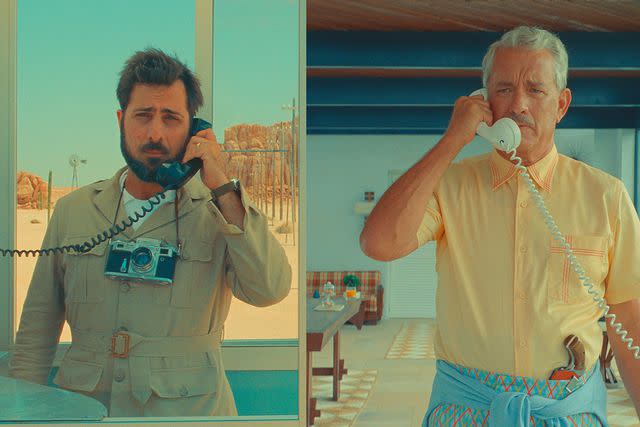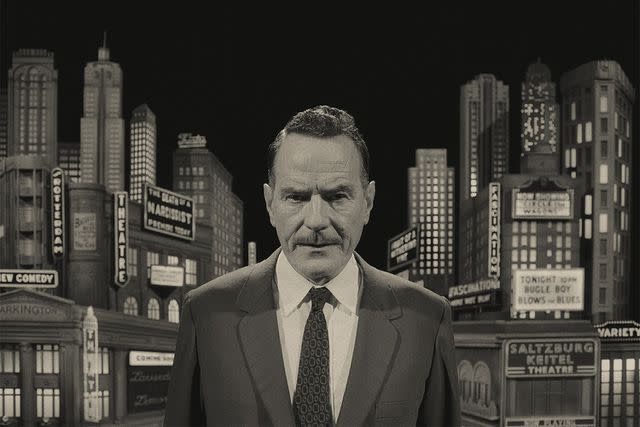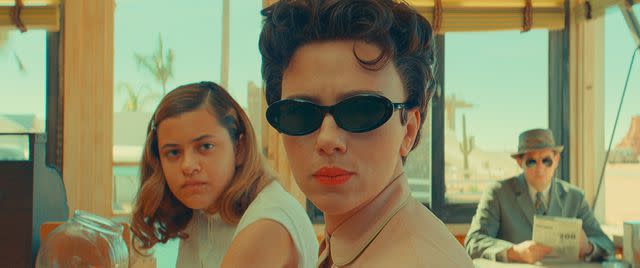Nominated for Nothing: The Academy didn't wake up to “Asteroid City” because it couldn't fall asleep
Wes Anderson's latest feature deserved more consideration from the Oscars.
They were destined to score zero Academy Awards, but they won our attention throughout a year (and awards season) like no other. Ahead of the 96th Oscars ceremony on March 10, Entertainment Weekly is breaking down the year's best movies, performances, and directorial achievements that were nominated for nothing.
The film: Though it may seem like a quintessential Wes Anderson film, the director’s latest feature is also unlike any other he’s made before. Set in 1955, Asteroid City involves both explicit science fiction elements and a working knowledge of the ‘50s New York theater scene.
In other words, Asteroid City is a TV documentary (depicted in black-and-white) about a Thornton Wilder-esque play (shot in vibrant color worthy of Looney Tunes cartoons) about the intersection of atomic testing, postwar science education, and Hollywood cinema in the ‘50s. It features a stacked cast of movie stars, including both Anderson regulars such as Jason Schwartzman and new collaborators such as Scarlett Johansson, who each put their spin on the director’s deadpan dialogue.

Courtesy of Pop. 87 Productions/Focus Features
Jason Schwartzman and Tom Hanks in 'Asteroid City'Saying “only Wes Anderson could have made this” has become a dismissal from some corners, but one need merely look at the director’s many TikTok imitators to understand how difficult it is to pull off these perfectly coordinated frames and highly specific tones. Seen from another angle, you might say that making such unique films should qualify Anderson for a Best Director nomination. But that was obviously a crowded field this year, with deserving nominee Greta Gerwig already left off the Academy’s official list. Even so, this razor-sharp script is alternately hilarious (“bring me my cocktail and my pill”) and melancholy (“I never had children. Sometimes I wonder if I wish I should’ve”) enough to have qualified for Best Original Screenplay.
It’s also important to remember that these movies aren’t made by Anderson alone. Asteroid City’s beautiful Southwestern vistas and immaculate compositions (not to mention the mix of color photography and black-and-white) could have earned Anderson’s longtime cinematographer Robert Yeoman a nomination, while production designer Adam Stockhausen did just as much “building a city in the desert” as Oppenheimer did. Meanwhile, the original song “Dear Alien (Who Art in Heaven)” was one of the funniest cinematic moments of 2023.

Why it wasn’t nominated: The Academy has demonstrated a lack of respect for Anderson’s films so consistently over the years that it now just feels plain rude. Sure, he’s almost certainly going to win an Oscar this year for Best Short Film (The Wonderful Story of Henry Sugar), but that might just be the power of name recognition in a category often devoid of stars.
Although actors clearly love being in Anderson’s films (check that Asteroid City cast list again) the actors' branch refuses to reward the subsequent performances, even when they’re hilarious and heartbreaking. Not even Gene Hackman and Ralph Fiennes were nominated for their incredible work with him!
Some might say these snubs are because the performances in Anderson’s films come off very controlled, but just as likely is the fact that the characters are often complicated, original inventions rather than cosplay impersonations of famous historical figures. Twenty-five years after establishing the archetype of the Anderson protagonist with his breakthrough performance in Rushmore, Schwartzman has gone from perfectly capturing over-educated teenage angst to now giving a similarly funny and aching portrait of parental alienation and spousal grief. That full-circle bookend demonstrates the wisdom of age and the skills that decades of experience can bring. Well, maybe years from now Schwartzman can play an inventor or a president and finally get some Oscar recognition.
Without getting too harsh, it’s important to remember that though the Oscars present themselves as objective judges of cinematic value, these nominations are often as much about campaigning as they are about quality. And there’s no question that the Academy’s disinterest in Anderson is mutual. Awards aren’t why he or his collaborators make these movies; two-time Oscar winner Tom Hanks didn’t join Asteroid City because he wanted another trophy. So why does Anderson make his movies this way? Funny you should ask…

Why history will remember it better than the Academy did: For one thing, Asteroid City was popular among moviegoers, earning $54 million at the box office against its $20 million budget. It was also keyed into a similar zeitgeist as 2023’s biggest films. Most cinematic histories of this year will revolve around the Barbenheimer phenomenon, and Asteroid City almost felt like the synthesis of those two blockbusters since it both tackled the legacy of the atomic bomb and featured a showstopping (if brief) performance from Margot Robbie.
Even outside the confines of this particular year, Anderson has proven himself a filmmaker worthy of analysis, and Asteroid City is a Rosetta Stone for understanding his artistic approach — though it does take more than one viewing to understand why. Anderson himself told EW last year that "you might have to see it once just to get the whole idea of it. Then, the second time, you might be able to just experience it." Repeat viewings might be too much to ask of awards voters who are already flooded with films to consider, but they do reveal the reasoning behind Asteroid City.
Early in the film, the actor played by Schwartzman's Augie asks his playwright (Edward Norton), "Why does Augie burn his hand on the Quickie Griddle?" This is a reference to a scene that actually comes toward the end of Asteroid City, and may not make sense at first glance. With more consideration, it becomes clear that Schwartzman's character is struggling with performing in a piece he doesn't understand: "I still don't understand the play." His director (Adrien Brody) replies, "Doesn't matter. Just keep telling the story." But an even better answer comes in a different scene a few minutes later, when acting teacher Saltzburg Keitel (Willem Dafoe) leads his class in the chant, "You can't wake up if you don't fall asleep."
Why do Anderson's characters act this way? Why does he create films with such a complicated, Russian nesting doll structure? That's the wrong question. This is cinema, and if you are willing to give yourself over to this story of moving images, then these metafictive shake-ups and structural bookends can have a truly profound effect. Long after this year's Oscars have come and gone, Asteroid City will be there to wake you up — but only if you fall asleep.
EW's countdown to the 2024 Oscars has everything you're looking for, from our expert predictions and in-depth Awardist interviews with this year's nominees to nostalgia and our takes on the movies and actors we wish had gotten more Oscars love. You can check it all out at The Awardist.
Related content:
Nominated for Nothing: Why the Oscars' TKO of The Iron Claw is below the belt
Wes Anderson hasn't seen your Wes Anderson memes — and doesn't want to
Here's what you need to know about Asteroid City, courtesy of Wes Anderson
Scarlett Johansson teases her Bette Davis-esque character in Wes Anderson's Asteroid City
Read the original article on Entertainment Weekly.

 Yahoo News
Yahoo News 
